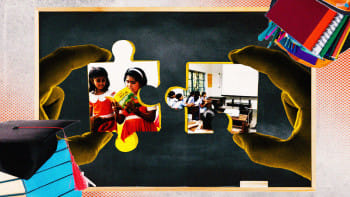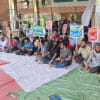Beyond quotas: Education, employment, and the unfinished revolution

Abu Sayed's life embodied the aspirations of millions of young Bangladeshis. As the son of a farmer and one of nine children, he was determined to overcome his circumstances. Sayed's pursuit of a scholarship at one of the nation's top universities was fueled by the belief that education could transform his destiny. However, his hopes were undermined when the government reinstated a job quota system, reserving 30 percent of coveted government positions for the descendants of freedom fighters. Faced with the disregard of his hard work, Sayed made a fateful decision: to stand against this injustice. Tragically, he sacrificed his life for the cause, becoming a martyr for a movement that sought not just reform, but equality, equity and justice for all.
Sayed's death, alongside the incalculable loss of many others, and the subsequent student revolution were not merely about job quotas; they signaled a much deeper crisis—a crisis of opportunity that begins with education and extends into employment.
In Bangladesh, inequality starts with education. The reality is stark: the student-to-teacher ratio in rural areas, where two-thirds of our students reside, is an appalling 1:34, according to the Bangladesh Bureau of Educational Information and Statistics. The few well-trained teachers and reputable institutions are concentrated in urban centers, leaving most of our youth with inadequate schooling. This imbalance doesn't just affect educational outcomes; it perpetuates a cycle of poverty, limiting the economic prospects of entire generations.
But education is only one side of the coin. The other is employment. Bangladesh is home to one of the largest youth populations in the world, with nearly 20 percent of the total populated aged between 15 to 24. This demographic could be our greatest asset, driving economic growth and innovation. Yet, there is a fundamental mismatch between the skills our education system provides and the demands of the job market. As a result, millions of young people are left competing for a limited number of jobs, while industries struggle to find the skilled workers they need. The official youth unemployment rate in 2022 stood at 10.6 percent, though this figure is likely an underestimate.
Addressing these challenges requires more than incremental change; it requires a transformative approach. Enter education technology, or EdTech. From the perspective of an economist, EdTech serves as a dual intervention—on the demand side, it significantly lowers the cost of education, broadening access; on the supply side, it utilises a scalable "one-is-to-many" model, allowing high-quality centralised resources and teaching to reach students nationwide.
Just as the digital era has reshaped industries, education stands on the cusp of a technological revolution. EdTech represents a new form of learning architecture that harnesses the power of the internet to create efficiency, standardise access, and democratise learning. Imagine a platform where personalisation, adaptive learning, gamification, and immersive experiences are not just buzzwords, but the foundation of how students across Bangladesh learn every day. EdTech has the potential to redefine how education is resourced and consumed, and potentially allow Bangladesh to leapfrog traditional development cycles.
One way to accelerate this transformation is through public-private partnerships (PPPs). As it stands, only one (project #66) out of the 80 listed PPP projects in Bangladesh is in the education sector highlighting the vast room for expansion. These collaborations can bridge the gap between educational access and economic opportunity. Imagine a scenario where the government works hand-in-hand with credible and compliant private EdTech companies to leverage cutting-edge digital platforms that bring high-quality educational resources to every corner of Bangladesh.
In rural areas where access to trained teachers is limited, digital platforms can deliver interactive lessons and personalised learning experiences tailored to the needs of each student. This approach could be particularly transformative in Bangladesh, where traditional education methods have often fallen short. By integrating technology into the classroom, we can move away from rote memorisation and towards problem-based learning, equipping students with the critical thinking skills they need to thrive in a rapidly changing world.
However, technology alone isn't enough. To be effective, these digital platforms must be supported by continuous professional development for teachers. Blending face-to-face training with online resources can empower teachers to become facilitators of learning, rather than mere lecturers. In the age of AI, technology becomes a classroom co-pilot. This shift could help address the severe shortage of trained teachers, particularly in rural areas, by leveraging the expertise of a few to benefit the many.
Moreover, aligning education with employment is crucial. By fostering partnerships between educational institutions and industries, we can ensure that students are not only learning the skills they need for today's job market but are also being prepared for the jobs of the future. These partnerships can help develop curricula directly tied to market needs, ensuring that graduates are job-ready and industries have access to a skilled workforce.
The economic argument for such reforms is clear. Aligning education with employment needs has been shown to significantly reduce youth unemployment, especially in middle-income countries like Bangladesh. Such alignment would help save the economy billions in lost productivity and, by creating a more skilled workforce, attract foreign investment, drive innovation, and position Bangladesh as a leader in the future global economy.
At this pivotal moment, the interim government has a unique opportunity to implement key reforms that will pave the way for a more equitable education system. In addition to leveraging existing digital solutions through public-private partnerships, investing in school infrastructure is crucial to ensure students can access modern tools. Equally important is making smartphone ownership and mobile data much more affordable. According to the GSMA, Bangladesh's total tax on mobile internet is about 26 percent—one of the highest in South Asia—acting as a critical barrier to more widespread digital adoption. Reducing these taxes and investing strategically can empower the next generation with the digital tools they need to succeed.
But beyond the economic benefits, there is a moral imperative to act. The student-led uprising was a powerful reminder that the people of Bangladesh are no longer willing to accept a status quo that leaves so many behind. They are demanding a fair chance—a level playing field where their hard work and talents are rewarded, not thwarted by systemic barriers.
The changes we need aren't just about economics—they're about the society we want to build. Do we want a Bangladesh where opportunity is the privilege of a few, or one where every child, no matter their background, has the chance to succeed? Achieving this vision aligns with the UN's Sustainable Development Goals, which also emphasises the importance of inclusive and equitable quality education. But realising this goal will require all of us—educators, entrepreneurs, policymakers, and parents—to work together.
The time for change is now. If we fail to act, we risk losing a generation to inequality and despair. But by investing in education and embracing the power of technology, we can build a future where every child in Bangladesh has the chance to achieve their dreams. This is how we honor the legacy of those who have fought—and continue to fight—for a just and equitable future. This is not just about building a better education system. It's about building a better Bangladesh.
Shahir Chowdhury is a CFA charterholder with over a decade of experience working in financial services in London. He is the founder and CEO of Shikho, an EdTech company dedicated to democratising access to high-quality education across Bangladesh.
Views expressed in this article are the authors' own.
Follow The Daily Star Opinion on Facebook for the latest opinions, commentaries and analyses by experts and professionals. To contribute your article or letter to The Daily Star Opinion, see our guidelines for submission.

 For all latest news, follow The Daily Star's Google News channel.
For all latest news, follow The Daily Star's Google News channel. 











Comments